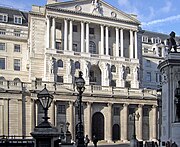United Kingdom officially enters economic recession
Friday, January 23, 2009
The United Kingdom has officially entered recession, with two consecutive quarters of negative growth. The last recession for the UK was nearly 18 years ago.
The UK's gross domestic product shrank by 0.6% in the third quarter of 2008; this was followed by a 1.5% contraction in the following quarter. "The increased rate of decline in output was due to weaker services and production industries output," commented the Office for National Statistics in a statement released today.

"Manufacturing output made the largest contribution to the slowdown, falling by 4.6 per cent compared with a 1.6 per cent decrease in the previous quarter," the Office continued. Agriculture, fishing and forestry were the only industries not to fall between the last two quarters.
UK shadow chancellor George Osborne commented that, "I think we are facing an exceptionally difficult time and unfortunately the figures that have just come out today confirm this is now going to be the worst recession for a generation." Bank of England Governor Mervyn King had previously commented that he felt there would be a recession until at least the first half of 2009, accompanied by "further marked falls in output."
The UK joins a long list of countries in recession, including Germany, Italy, Singapore and the United States. The current global financial crisis was triggered by the subprime mortgage crisis in the US.
Related news
- "Japan enters recession" — Wikinews, November 18, 2008
- "Eurozone now officially in recession" — Wikinews, November 14, 2008
- "UK Prime Minister: The world will enter a recession" — Wikinews, October 22, 2008
- "World stocks plunge on fears on US recession" — Wikinews, January 21, 2008
Sources
- "UK falls into recession first time in 18 yrs" — Business Standard, January 23, 2009
- "Britain Officially In Recession" — Sky News, January 23, 2009

